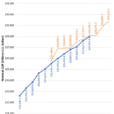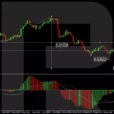It is fair to note that the aspirational phrase “ever closer union” has caused a lot of distress in certain quarters in EU member states with a number of people equating it to mean that the EU seeks to become a European superstate, perhaps with a US-style Federal government and nation states reduced to a secondary role. This couldn’t be further from the truth, in reality, however, it has spawned calls for a two-speed Europe with core states working faster towards a degree of fiscal unity.

In the aftermath of the Brexit vote, the fortunes of the Eurozone economy and the British economy have reversed with the latter seeing more sluggish growth. To amplify this point, UK retail sales of non-food items have dropped to their lowest ever recorded pace of growth, according to the British Retail Consortium (BRC). This sector showed growth of 0.2% for the year to October, the worst performance since records started to be kept in January 2011 (after the worst of the Global Financial Crisis).
The chief executive of BRC, Helen Dickinson, commented: “consumers appear to have opted for outdoor experiences and excursions during half term, over visits to the shops.” With inflation at a five year high, she believes that consumers were: “ever more cautious in considering what purchases they can afford”.
The Bank of England’s decision to raise interest rates (albeit it to a historically very low level) may make consumer borrowing more expensive which could further depress retail sales in the run-up to Christmas.
In contrast, on the other side of the English Channel, retail sales in the Eurozone enjoyed a 0.7% rise over the previous month (September) and by 3.7% on a year-on-year basis. The figures saw strong sales in clothing, food and tobacco (although car fuel sales fell by 0.4%).
The ECB increased its growth forecast for 2017 to 2.2% which is the best Eurozone growth seen for a decade.











Leave A Comment